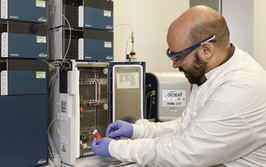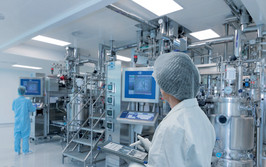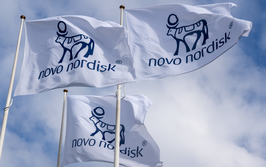Stemming the Brain Drain
Can African professionals be persuaded to pursue opportunities at home?

Africa is suffering from a skills exodus. Reports estimate that one in three skilled professionals from Africa now live and work in the developed world (1). This loss of talent has serious ramifications not only for the continent’s economy but also for the growth of its innovative R&D pharmaceutical industry. Africa imports many of the drugs it consumes and has yet to cement itself as a center for R&D. With such heavy reliance on foreign products, how will the continent move toward a more independent future?
The answer lies in dismantling the negative perceptions that hold Africa in a vicious cycle of dependence. For the most part, Africa is viewed through the lens of poverty – and its high disease burden makes foreign medical innovation appear to be the best option that African governments have to offer patients. Though there is some truth to this notion, it, unfortunately, adds fuel to the fires of afro-pessimistic sentiment. Many pharmaceutical stakeholders both within and outside the continent have yet to see African innovation and the benefits it can bring to patients. And without evidence of innovative pharmaceutical prowess, Africa cannot attract the expert workforce needed to build its pharmaceutical infrastructure.
But even if there were examples of African innovation – and there are – the idea that foreign goods are somehow superior seems hardwired. For example, if asked to choose between a pair of leather shoes made in Italy and a pair made in Zambia, how many people would opt for shoes made by an African craftsman – even if the quality was better? Shoes may seem a trivial example, but they highlight a more serious issue. Even if African companies were developing more high-quality medicines, would patients at home and abroad feel confident in using them?
Though it is impossible to say with certainty how people will respond to Africa’s future innovative pharmaceutical offerings, stakeholders from across the continent have the opportunity to confront the perceptions that plague the industry. It will require a multifaceted approach – but, from my own experience, I’ve realized that we all have a role to play in creating a positive perception of the industry.
A journey home
As an African academic, I have faced the challenging decision of leaving home to pursue educational opportunities. Like many others, the attraction of advanced facilities and thorough training pushed me to pursue international education. My doctoral studies at the University of Cambridge were invaluable – not only was I able to pursue my research interests in a way that would not have been possible in Africa, but I also had the chance to build my network and work alongside individuals at the cutting edge of science. Though I had every intention of returning to my native Zambia once my studies were completed, I found that, without the appropriate infrastructure for research and development, my options would be limited.
The frustration I felt wasn’t unique – many other African students and postgraduates have found themselves in similar situations. I chose to return to help support the academic careers of young professionals and launch a drug development center, H3D, at the University of Cape Town. The center focuses on the discovery of potential medicines for disease indications that predominantly affect Africans and developing technology platforms that allow customization of medicines to African patients’ needs. Though my decision has brought much value to my life, those who choose different paths cannot be blamed for making the decisions most appropriate for their professional goals.
Nonetheless, we found it difficult to fill positions in the center’s early days. We were embedded into the University of Cape Town’s ecosystem and our expert team had a wealth of industry experience – but the local professionals we wanted to hire simply weren’t there. Advertisements for postgraduate positions, for example, were answered by international applicants. Though it would have been wonderful to have greater South African representation, we found that the people who did apply were attracted to the center because we had managed to create an R&D environment like those found in Europe and the USA.
As the center matured, we were able to showcase our capabilities as a biopharmaceutical operation. This, in turn, attracted a more diverse pool of candidates, and we now have many talented individuals of African heritage working with us. Ultimately, having the right infrastructure in place helps build influence. And that helps drive change not only at the local level but also on a regional and international scale.
Advising government
The inability to retain talent across the continent has caused some to point the finger at governments. “Are our ruling bodies doing enough to prevent the mass departure of skilled professionals?” It’s a question that arises often. But such a complex issue has no simple answer. I believe that the responsibility for preventing the brain drain does not lie solely with our political institutions. Governments across Africa are investing in the training of their citizens, often sending people abroad to study. But if those who benefit from this funding choose not to come back, there is no return on investment. This, again, feeds into the cycle of dependence that prevents us from reaching our full potential. People rightly have the choice not to return – but if Africa is to develop a drug discovery and manufacturing ecosystem that rivals those elsewhere, it needs a critical mass of talent.
The lack of innovative pharmaceutical manpower also means that African governments haven’t seen many scientists and entrepreneurs setting up their own organizations. And despite investing in young talent, they often fail to see the importance of allocating resources to new R&D ventures. Will governments get on board when we can prove the benefits of these operations to society? I believe they will. At H3D, our research on malaria, tuberculosis, and antimicrobial resistance has seen us develop clinical candidates, create jobs, and work with leading figures from big pharma – and it has made the South African government one of our greatest supporters.
Though it is risky, I advise others to take the chance and launch their own R&D facilities. Doing so will force our leaders’ attitudes to change and could help build a robust innovative pharmaceutical ecosystem across the continent. We have the power to influence change, but we must take opportunities to do so as they arise. We owe it to future generations of scientists.
For a better tomorrow
African pharma has a promising future. More than ever, companies who take risks are establishing themselves as serious partners for international organizations. H3D recently partnered with the African Academy of Sciences, Bill and Melinda Gates Foundation, and the Medicines for Malaria Venture on “Grand Challenges Africa,” a scheme that encourages innovation to address the continent’s health and development needs. The project aims to expand the drug discovery community across Africa by, amongst other things, linking African academic institutions with partners from big pharma – crucially important for the future of our industry. The more R&D centers we have with advanced capabilities and robust infrastructure, the greater our impact. It won’t be easy to achieve, but it is within our reach.
I am also excited by the possibilities that regulatory harmonization will bring to the community. At the regional level, regulatory bodies are improving access to much-needed medicines. In southern Africa, for example, ZAZIBONA brings together regulators from Botswana, Namibia, Zambia, and Zimbabwe. The benefit of this transnational collaboration is that, once a drug has been approved in one country, it is deemed fit for the rest. This ensures uniformity of dosing and pricing and ultimately helps improve the perception of our pharmaceutical industry among patients and external stakeholders.
At the moment, a continent-wide regulatory authority is not a reality. But, as an industry, we are getting closer to the point where we can speak with a unified voice. Though we still face challenges, we are proving ourselves willing and capable of managing them. I can only hope that these positive steps forward will give some of Africa’s best and brightest pause for thought when making decisions about their professional futures.
- African Union, “Pharmaceutical manufacturing plan for Africa business plan” (2012). Available at: https://bit.ly/32Ughx3.



















